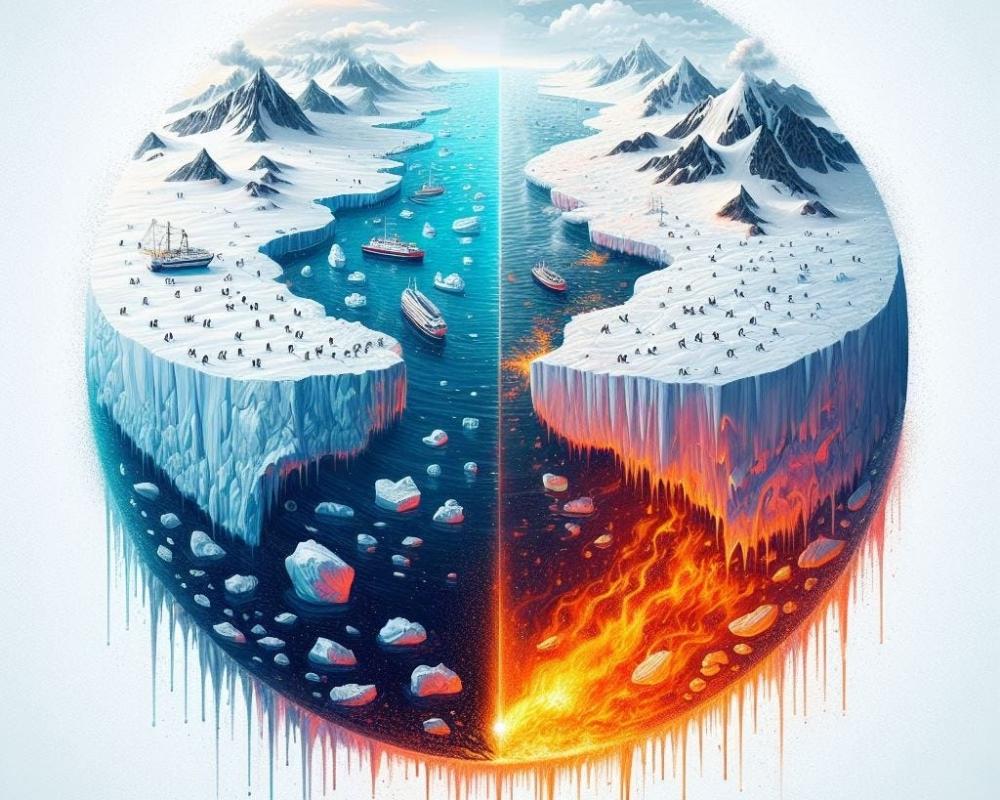Explore the World's Best Ideas
Join today and uncover 100+ curated journeys from 50+ topics. Unlock access to our mobile app with extensive features.
The Difference
The Arctic and Antarctic are responding differently to climate change due to their distinct geographical and environmental conditions. The fundamental differences in geography, along with varied atmospheric and oceanic conditions, contribute to the contrasting responses of the Arctic and Antarctic to the changing climate.
6
66 reads
Arctic Ice - Melting Away in a Heatwave Havoc
- Warming Temperatures: The Arctic has experienced record temperatures, with a Siberian heatwave pushing air temperatures over 100 degrees Fahrenheit for the first time on record.
- Feedback Loops: The loss of reflective sea ice exposes dark open ocean, which absorbs more of the sun’s heat, leading to further ice melt.
- Changes in Ice Growth Patterns: There’s more heat in the ocean now than there used to be, disrupting the pattern of autumn ice growth.
6
54 reads
Antarctic Ice - Cold Shoulder to Warming Trends
- Atmospheric Circulation: Changes in atmospheric circulation have led to more sea ice being carried to the coast by wind, stabilizing ice shelves.
- Ocean Surface Cooling: Antarctic sea ice has expanded due to ocean surface cooling associated with multidecadal variability in the Southern Ocean.
- Complex InteractionsThe Antarctic sea ice is influenced by a variety of factors, including sub-ice-shelf melting, stratospheric ozone depletion, and tropical teleconnections.
5
48 reads
Key Terms
Reflective: Sea ice's ability to reflect sunlight helps regulate Earth's temperature.
Feedback loops: Mechanisms where output influences input, leading to amplification or dampening of initial change.
Multidecadal variability: Fluctuations or changes that occur over decades.
Stratospheric ozone depletion: Gradual thinning of the ozone layer in Earth's stratosphere due to ozone-depleting substances.
Decadal oscillations: Cyclic variations occurring approximately every ten years.
5
45 reads
IDEAS CURATED BY
CURATOR'S NOTE
Expect ice-free Arctic summer within 15 years
“
Similar ideas
4 ideas
8 ideas
Blissfully Cool Facts About Ice
mentalfloss.com
4 ideas
There’s a new ocean now—can you name all 5?
nationalgeographic.com
Read & Learn
20x Faster
without
deepstash
with
deepstash
with
deepstash
Personalized microlearning
—
100+ Learning Journeys
—
Access to 200,000+ ideas
—
Access to the mobile app
—
Unlimited idea saving
—
—
Unlimited history
—
—
Unlimited listening to ideas
—
—
Downloading & offline access
—
—
Supercharge your mind with one idea per day
Enter your email and spend 1 minute every day to learn something new.
I agree to receive email updates




